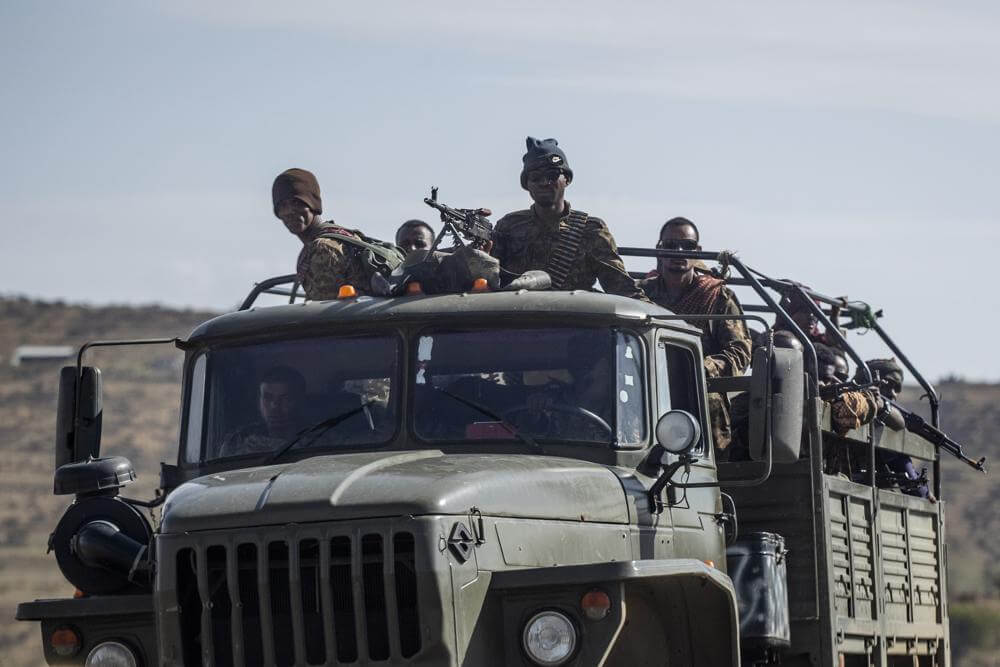The months-long relative calm in Ethiopia’s Tigray region was broken on Wednesday as large-scale fighting resumed between Tigrayan militants and government forces. Both the Ethiopian government and the Tigray People’s Liberation Front (TPLF) rebels accused the other of starting the hostilities.
The Ethiopian communication service released a statement saying that the TPLF launched an attack on 5 AM Wednesday in the towns of Bezobel, Zobel, and Tekulesh. “They [TPLF] officially violated the ceasefire with their actions.” The government said Ethiopian troops are on high alert for further attacks and are working together to defeat the “terrorists,” it said.
The statement urged all Ethiopian citizens to unite to repel the TPLF. Furthermore, it called on the international community to “put strong pressure on the TPLF to stop drumming up war.”
In a separate statement, Addis Ababa accused the rebels of destroying the relative peace of the past few months. Titled ‘TPLF’s Belligerence Must Be Condemned,’ the statement noted that while the government is “outlining a road map for peace the other side is declaring war.”
“When the Government is exploring all options to consolidate the humanitarian truce, the TPLF is actively working for the demise of the truce,” it lamented, adding, “It has been mobilising the population in the Tigray region with threats to all those opposed to forced conscription. Draconian punishments and denial of access to humanitarian aid are used as weapons to mobilise the population for war.”
In this respect, the statement mentioned that if the international community fails to exert pressure on the TPLF to renounce violence, it would be “tantamount to enabling it to launch another round of aggression and bloodbath.”
Fighting erupted on the border of the Tigray region in northern Ethiopia on Wednesday, shattering a five-month cease-fire between rebels and the government and raising fears for the 6 million people trapped in one of the world’s worst humanitarian crises https://t.co/gIZweudTTG
— Abdi Latif Dahir (@Lattif) August 24, 2022
The military also shot down a plane believed to be carrying weapons for the TPLF, the Ethiopian News Agency reported. A defence official told the agency that the plane entered Ethiopia’s airspace via Sudan and was “heading to Tigray to deliver armaments to the terrorist group.”
The TPLF’s external affairs office rejected the government narrative as a “blatant lie.” “No plane entered Tigray; nor was an imaginary plane shot down.” It claimed that the Abiy [Ahmed] government “is in search of bogeyman to justify its ongoing genocidal campaign” and aimed to present Tigray’s self-defence “as an external project, not a struggle for survival,” it retorted.
Following five months of peace violence has recommenced in the northern Ethiopian region of Tigray this week. There have been widespread reports of atrocities, including mass killings and sexual violence.
— Senator Jordon Steele-John (@SenatorJordon) August 25, 2022
“If history is any guide, the Abiy regime is laying the groundwork for aerial assaults on Tigray,” the rebel group asserted.
TPLF spokesperson Getachew Reda also denied Addis Ababa’s claims and said the government launched an offensive against TPLF positions in Tigray. He noted that government troops and Amhara militias had been attacking their positions for over a week. He thus argued that the TPLF was forced to launch an offensive “to defend our positions.”
It is not clear if there were any casualties in the renewed bout of fighting, which has broken a five-month-long ceasefire.
In March, the Ethiopian government announced a ceasefire in the region to allow humanitarian aid to pass through. Although the TPLF did not make any official comments, it refrained from launching attacks. Furthermore, in June, PM Abiy said the government established a committee to oversee peace talks with the TPLF. However, the latest round of violence threatens to undo any progress made so far.
The international community expressed serious concerns over the situation in Tigray. United Nations Secretary-General António Guterres said he is “deeply shocked” by the fighting and called for an “immediate cessation of hostilities.” Similarly, African Union chairperson Moussa Faki Mahamat urged both sides to “resume talks to seek a peaceful solution.”
Despite the talk of negotiations and cessation of hostilities, many who were skeptical about the start of talks are not surprised by the offensive.
— Mehari Taddele Maru (@DrMehari) August 24, 2022
The international community, once again,failed to take measures to avert this by ending a medieval-like siege in the 21st century. 2
United States Secretary of State Antony Blinken called on the TPLF and the Abiy government to “redouble efforts to advance talks to achieve a durable ceasefire without preconditions.” Blinken also asked “all parties to respect the provision of food and fuel by humanitarian actors and refrain from militarising humanitarian relief.”
World Food Programme (WFP) chief David Beasley, meanwhile, said the TPLF stole 570,000 litres of fuel for WFP operations in Tigray. “Millions will starve if we do not have fuel to deliver food. This is outrageous and disgraceful. We demand return of this fuel now,” he tweeted.
According to the WFP, an estimated 9.4 million people in northern Ethiopia are in dire need of food assistance and warned that the situation could get worse “owing to an unprecedented lack of funding.” It has also reported that 40% of Tigrayans suffer from an “extreme lack of food,” 83% are food insecure, and 13% of Tigrayan children under five are malnourished.
Ethiopia has been in the middle of a severe humanitarian and political crisis since November 2020, when PM Abiy ordered a military response to an attack on a federal army camp in Tigray by the TPLF, which was declared a “terrorist” organisation by the Ethiopian parliament last year. The fighting quickly boiled over into a full-scale armed invasion by Ethiopian troops, who partnered with Eritrean soldiers in their operation.
The conflict in Tigray has killed tens of thousands of people, displaced over two million, and witnessed grave human rights violations, including mass killings, rapes, and deliberate starvation. Both the Ethiopian government and the TPLF have been accused of committing atrocities.

